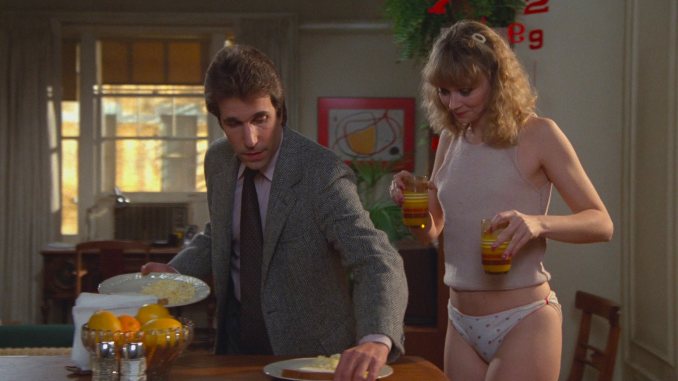Night Shift Let Ron Howard Direct a Morgue-Set Sex Romp 40 Years Ago

Some of you might think the directorial career of child-actor-turned-sitcom-star-turned-veteran-filmmaker Ron Howard began when he had a young Tom Hanks fall in love with Daryl Hannah’s sexy mermaid in the 1984 comedy Splash. But he actually dropped two feature films before that. He directed and starred in Grand Theft Auto 45 years ago, a Roger Corman-produced car-chase comedy where he was one-half of an eloping young couple—and getting chased down by people looking to stop it. But 40 years ago this month, he directed the studio comedy Night Shift, which I have to admit I caught on cable way too many times as a youngster.
The first movie he worked on with producer and longtime partner Brian Grazer, Howard got his Happy Days co-star Henry Winkler to star as Chuck Lumley, a former Wall Street broker who’s now working as a nighttime city morgue attendant. His meek, simple life gets predictably turned upside-down when he meets two people: Bill “Blaze” Blazejowski (Michael Keaton), his new fast-talking, side-hustling co-worker; and Belinda Keaton (a pre-Cheers Shelley Long), a prostitute who lives next door in his building.
Chuck becomes concerned for Belinda and her business dealings, which start getting rough after her pimp—named Franklin Delano Roosevelt Jones—is killed by two thuggish associates (one played by comedian and longtime TV cop Richard Belzer). When he tells Bill about it, Bill gets the idea that they should be “lovebrokers,” serving as business managers for Belinda and her crew of pimpless streetwalkers. A reluctant Chuck goes along with the plan, and he and Bill run this business out of the morgue.
For some reason, comedies about prostitution were all the rage in the early ‘80s. The movie version of the Broadway musical The Best Little Whorehouse in Texas, starring Burt Reynolds and Dolly Parton, was also in theaters around that time. The following summer, Tom Cruise became a star as a kid who turns his parents’ house into a brothel in Risky Business, while Dan Aykroyd played a college professor pretending to be a dangerous pimp in Doctor Detroit. (That same summer, he also starred in Trading Places, where his love interest was Jamie Lee Curtis’s heart-of-gold hooker.) Just like Whorehouse, Shift was based on a true story: In 1976, two city employees and a laborer were charged with operating a call-girl ring out of a morgue. (“It was a very well run, professional operation,” a detective told the New York Times.) The story goes that Grazer saw this item and instantly thought this was big-screen material.
-

-

-

-

-

-

-

-

-

-

-

-

-

-

-

-

-

-

-

-

-

-

-

-

-

-

-

-

-

-

-

-

-

-

-

-

-

-

-

-








































